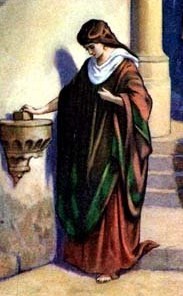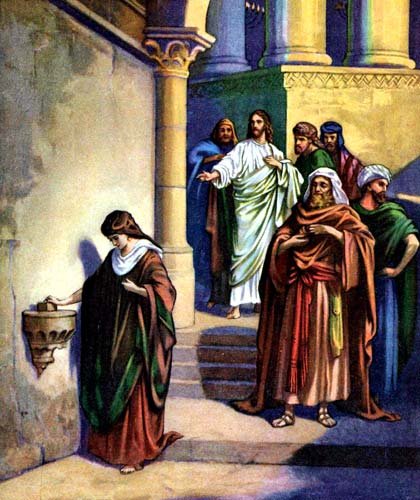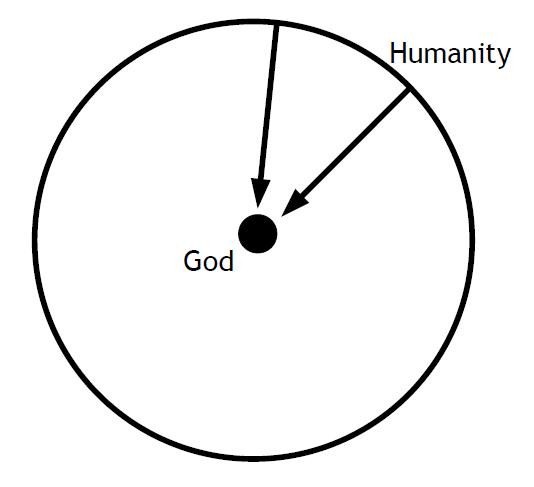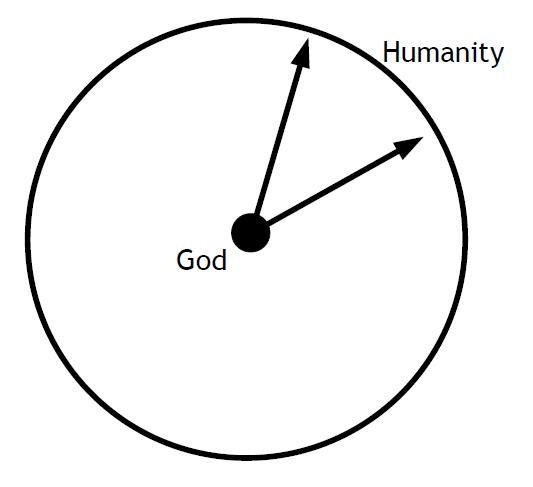Jesus points to a widow as she adds her two copper coins to the temple treasury (Mark 12:38-44). Perhaps she is an older woman, with the death of her husband occurring late in life. She may be a young widow raising small children. More to the point, the widow in Mark 12 — like widows throughout the Bible — is economically insecure because she does not have a man to support & protect her.
Our 21st-century ears might hear the sexism and patriarchy of those circumstances, but what we need to hear most of all is the desperation of such circumstances. Widows were virtually their own economic class, one of the poorest economic classes, with no guarantees for living from one day to the next. This is why, across the Bible, when God or when the prophets or when Jesus admonishes people to care for the widows, the message isn’t “Be nice because they’re sad and they’ve gone through some tough times” … the message is “Don’t let them go under for lack of finances and food.”
“Do not deprive the orphan of justice or take the widow’s last coat” (Deuteronomy 24:17). “Do not send the widows away empty-handed, do not crush the outstretched arms of the orphan” (Job 22:9, adapted). The Bible calls God the protector of widows (Psalm 68:5), the One who supports widows and orphans (Psalm 146:9).
God’s heart breaks most of all for the least of these, not for the modestly comfortable of these, and surely the widow in Mark 12 is among the least in her extreme poverty. Jesus notes that the two copper coins she gives to the temple treasury are everything she has. In those days, two copper coins equaled a penny, and sixty-four pennies were a day’s wages for a laborer. The widow’s gift of two copper coins is 1/64 of a daily living wage, and it is everything she has!
We hear this and we’re amazed by her. We’re blown away by the courage that it takes to give everything you have when you have almost nothing. Our typical take-away from this story is that we should be as generous as this widow when we give to God. We tell ourselves (or the preacher tells us) that we should be willing to give it all — willing to risk it all — and not hold back when we make financial gifts to God and to God’s work. We say that we should give without counting the cost. The widow’s offering is captivating … it’s moving … it’s inspiring … it’s courageous … it’s incredible in its generosity …
… it’s also unfair.
When we hear the story of the widow’s offering, we focus in on her money and her daily budget. Because Jesus observes aloud that her offering is 100% of her budget, we conclude that this is a math problem — a math parable — to teach us about giving a proper percentage of our own budgets.
But when we focus in on the widow’s money, we miss the whole picture. When we focus in on her two copper coins, we easily forget that there’s more to this story; there is something else that happens before Jesus points out the widow’s offering.
 The story actually starts with Jesus’ criticism of the scribes for their love of attention and acclaim. “They like to walk around in long robes and be greeted with respect in the marketplace. They love to have the best seats in the synagogues and places of honor at banquets. They say long, flowing prayers for the sake of appearance, and they devour widows’ homes” (Mark 12:38-40, adapted).
The story actually starts with Jesus’ criticism of the scribes for their love of attention and acclaim. “They like to walk around in long robes and be greeted with respect in the marketplace. They love to have the best seats in the synagogues and places of honor at banquets. They say long, flowing prayers for the sake of appearance, and they devour widows’ homes” (Mark 12:38-40, adapted).
Throughout the Old Testament, there are references to rules being made so that it was tremendously exacting for widows and foreigners to seek justice when they were wronged; decrees being advanced to make it harder for the poor to beg on street corners or glean leftover grains from the fields; and statues being written that eased the way for the rich to further oppress the poor by “lending” money at a high price (Isaiah 10:1-2). The prophet Ezekiel laments this trend: “The princes of the land are like a roaring lion tearing the prey; they have devoured human lives … while the priests have done violence to [God’s] teaching and destroyed lives for dishonest gains. Altogether the people have practiced extortion and committed robbery by oppressing the poor and needy” (Ezekiel 22:23-30, adapted).
The prophets, God, and Jesus here in Mark 12 have nothing but condemnation for those who have the means to devour others’ lives for their own gain and comfort. The widow’s offering might be inspiring — and certainly we need to be inspired out of our comfort toward more generous giving — but most of all the widow’s offering is unfair! The scribes in their temple leadership have set up an “offering” system that devours even the last two coins of a poor widow. They are eating her up financially, while she goes without anything to eat. They accept (require?) her generosity to God while remaining themselves ungenerous toward her needs.
Rather than putting us in the shoes of the widow and asking the familiar stewardship question of how we can give 100% of our lives and resources, I would put us in the shoes of the scribes and ask the stewardship question of what & who we are “eating up.” How are we participating in the system that devours the least of these? When do we sit back and welcome God’s generosity without looking around and recognizing opportunities for our own generosity? For whom do we set expectations that we ourselves do not meet or follow?
A simple graph demonstrates the intrinsic connection between caring for the Other and pursuing our relationship with God; between lovingkindness for neighbor and loving reverence for God. [I was introduced to this graph by Dr. David Mellott of Lancaster Theological Seminary.]

The outer circle represents all of humanity; the dot in the middle, God. In the life of faith, we seek to draw closer to God — to move toward the dot. Notice what happens as two or more people draw closer to God: they draw closer to one another as well. Coming closer to God brings us closer to others. Becoming closer to others draws us closer to God.
 The opposite is true as well. When we pull away from God, we begin to separate ourselves from one another. When we step back from others, when we retreat, when we overlook our neighbors, when we miss seeing one another’s needs and hearing one another’s stories, even when we dismiss someone who’s just seriously annoying, when we do not welcome one person as much as we welcome another person, we pull away from God.
The opposite is true as well. When we pull away from God, we begin to separate ourselves from one another. When we step back from others, when we retreat, when we overlook our neighbors, when we miss seeing one another’s needs and hearing one another’s stories, even when we dismiss someone who’s just seriously annoying, when we do not welcome one person as much as we welcome another person, we pull away from God.
Drawing closer to others as we draw closer to God isn’t optional or coincidental. We cannot move toward God all by ourselves, on our own little trajectories. Increasing love for God necessarily means increasing love for neighbors, and increasing love for neighbors absolutely draws us closer to God.
When Jesus points to the widow making her offering, he’s not asking us to focus in on her monetary gift. He’s pointing out the big picture of how we relate to people and how we relate to God. He’s bringing into focus how we see people & understand this world’s systems, and how God responds to the least and to systemic injustices. Jesus is not just pointing to her two coins, he’s pointing to her whole life. He’s inviting his disciples — he’s inviting us — to pay attention to her, to hear her story, to witness God in her life and in her person.
Essentially, Jesus is saying: “You want to find out what’s essential to God? Find out what’s essential in the life of the widow. You want to draw closer to God? Draw closer to her.”
Draw closer to the poor so that you can hear the stories and understand the systems that make poverty the tangled web it is. Draw closer to the neighbor who irks you with yelling or with toys in the yard or with contrary political opinions or with meticulous landscaping (or lack of). Draw closer to the person you see every day and each week, from the grocery cashier to the spouse, from the church member to the mail carrier. Listen, look, learn the stories you don’t know, watch for God at work in others’ lives.
Jesus sat down opposite the treasury, where he could take in the full picture — watch people coming-and-going, observe the world’s systems at work in the microcosm of the temple, see how people interacted with one another while they were practicing their faith — and he invited his disciples to do the same: “Draw closer to her, and thereby draw closer to God.”
Draw closer to “we” — closer to one another — if we want to be closer to God, closer to Thee.
Draw closer to Thee, if we hope to bring about a closer “we.”
Closer to Thee.
Closer to we.
Amen.
Sermon preached at Grace United Church of Christ on November 11, 2012.
